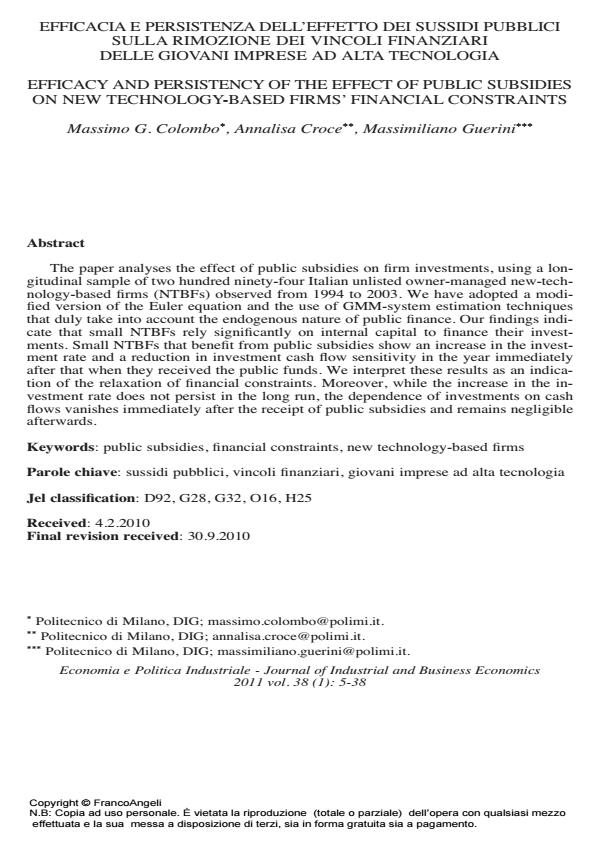Efficacy and persistency of the effect of public subsidies on new technology-based firms’ financial constraints
Journal title ECONOMIA E POLITICA INDUSTRIALE
Author/s Massimo G. Colombo, Annalisa Croce, Massimiliano Guerini
Publishing Year 2011 Issue 2011/1
Language Italian Pages 34 P. 5-38 File size 478 KB
DOI 10.3280/POLI2011-011001
DOI is like a bar code for intellectual property: to have more infomation
click here
Below, you can see the article first page
If you want to buy this article in PDF format, you can do it, following the instructions to buy download credits

FrancoAngeli is member of Publishers International Linking Association, Inc (PILA), a not-for-profit association which run the CrossRef service enabling links to and from online scholarly content.
The paper analyses the effect of public subsidies on firm investments, using a longitudinal sample of two hundred ninety-four Italian unlisted owner-managed new-technology- based firms (NTBFs) observed from 1994 to 2003. We have adopted a modified version of the Euler equation and the use of GMM-system estimation techniques that duly take into account the endogenous nature of public finance. Our findings indicate that small NTBFs rely significantly on internal capital to finance their investments. Small NTBFs that benefit from public subsidies show an increase in the investment rate and a reduction in investment cash flow sensitivity in the year immediately after that when they received the public funds. We interpret these results as an indication of the relaxation of financial constraints. Moreover, while the increase in the investment rate does not persist in the long run, the dependence of investments on cash flows vanishes immediately after the receipt of public subsidies and remains negligible afterwards.
Keywords: Public subsidies, financial constraints, new technology-based firms
Jel codes: D92, G28, G32, O16, H25
Massimo G. Colombo, Annalisa Croce, Massimiliano Guerini, Efficacia e persistenza dell’effetto dei sussidi pubblici sulla rimozione dei vincoli finanziari delle giovani imprese ad alta tecnologia in "ECONOMIA E POLITICA INDUSTRIALE " 1/2011, pp 5-38, DOI: 10.3280/POLI2011-011001